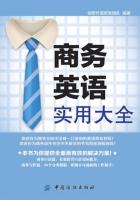To understand the nature of the present war—for in spite of the regrouping which occurs every few years,it is always the same war—one must realize in the first place that it is impossible for it to be decisive.None of the three superstates could be definitively con-quered even by the other two in combination.They are too evenly matched,and their natural defences are too formidable.Eurasia is protected by its vast land spaces,Oceania by the width of the At-lantic and the Pacific,Eastasia by the fecundity and industriousness of its inhabitants.Secondly,there is no longer,in a material sense, anything to fight about.With the establishment of self-contained e-conomies,in which production and consumption are geared to one another,the scramble for markets which was a main cause of previ-ous wars has come to an end,while the competition for raw materi-als is no longer a matter of life and death.In any case each of the three superstates is so vast that it can obtain almost all of the mate-rials that it needs within its own boundaries.In so far as the war has a direct economic purpose,it is a war for labor power.Between the frontiers of the super states,and not permanently in the possession of any of them,there lies a rough quadrilateral with its corners at Tangier,Brazzaville,Darwin,and Hong Kong,containing within it about a fifth of the population of the earth.It is for the possession of these thickly populated regions,and of the northern ice cap,that the three powers are constantly struggling.In practice no one power ev-er controls the whole of the disputed area.Portions of it are con-stantly changing hands,and it is the chance of seizing this or that fragment by a sudden stroke of treachery that dictates the endless changes of alignment.
All of the disputed territories contain valuable minerals,and some of them yield important vegetable products such as rubber which in colder climates it is necessary to synthesize by compara-tively expensive methods.But above all they contain a bottomless reserve of cheap labour.Whichever power controls equatorial Afri-ca,or the countries of the Middle East,or Southern India,or the In-donesian Archipelago, disposes also of the bodies of scores or hundreds of millions of ill-paid and hard-working coolies.The in-habitants of these areas,reduced more or less openly to the status of slaves,pass continually from conqueror to conqueror,and are ex-pended like so much coal or oil in the race to turn out more arma-ments,to capture more territory,to control more labor power,to turn out more armaments,to capture more territory,and so on in-definitely.It should be noted that the fighting never really moves beyond the edges of the disputed areas.The frontiers of Eurasia flow back and forth between the basin of the Congo and the north-ern shore of the Mediterranean;the islands of the Indian Ocean and the Pacific are constantly being captured and recaptured by Oceania or by Eastasia;in Mongolia the dividing line between Eurasia and Eastasia is never stable;round the Pole all three powers lay claim to enormous territories which in fact are largely uninhabited and unex-plored;but the balance of power always remains roughly even,and the territory which forms the heartland of each super state always remains inviolate.Moreover, the labor of the exploited peoples round the Equator is not really necessary to the world's economy. They add nothing to the wealth of the world,since whatever they produce is used for purposes of war,and the obj ect of waging a war is always to be in a better position in which to wage another war.By their labour the slave populations allow the tempo of continuous warfare to be speeded up.But if they did not exist,the structure of world society,and the process by which it maintains itself,would not be essentially different.
The primary aim of modern warfare (in accordance with the principles of doublethink,this aim is simultaneously recognized and not recognized by the directing brains of the Inner Party) is to use up the products of the machine without raising the general standard of living.Ever since the end of the nineteenth century,the problem of what to do with the surplus of consumption goods has been la-tent in industrial society.At present,when few human beings even have enough to eat,this problem is obviously not urgent,and it might not have become so,even if no artificial processes of destruc-tion had been at work.The world of today is a bare,hungry,dilapi-dated place compared with the world that existed before 1914,and still more so if compared with the imaginary future to which the people of that period looked forward.In the early twentieth century, the vision of a future society unbelievably rich,leisured,orderly,and efficient—a glittering antiseptic world of glass and steel and snow-white concrete—was part of the consciousness of nearly every liter-ate person.Science and technology were developing at a prodigious speed,and it seemed natural to assume that they would go on devel-oping.This failed to happen,partly because of the impoverishment caused by a long series of wars and revolutions,partly because sci-entific and technical progress depended on the empirical habit of thought,which could not survive in a strictly regimented society.As a whole the world is more primitive today than it was fifty years ago.Certain backward areas have advanced,and various devices,al-ways in some way connected with warfare and police espionage, have been developed,but experiment and invention have largely stopped,and the ravages of the atomic war of the nineteen-fifties have never been fully repaired.Nevertheless the dangers inherent in the machine are still there.From the moment when the machine first made its appearance it was clear to all thinking people that the need for human drudgery,and therefore to a great extent for human inequality,had disappeared.If the machine were used deliberately for that end,hunger,overwork,dirt,illiteracy,and disease could be eliminated within a few generations.And in fact,without being used for any such purpose,but by a sort of automatic process—by produ-cing wealth which it was sometimes impossible not to distribute—the machine did raise the living standards of the average human be-ing very greatly over a period of about fifty years at the end of the nineteenth and the beginning of the twentieth centuries.
But it was also clear that an all-round increase in wealth threatened the destruction—indeed,in some sense was the destruc-tion—of a hierarchical society.In a world in which everyone worked short hours,had enough to eat,lived in a house with a bathroom and a refrigerator,and possessed a motor car or even an airplane, the most obvious and perhaps the most important form of inequali-ty would already have disappeared.If it once became general,wealth would confer no distinction.It was possible,no doubt,to imagine a society in which wealth,in the sense of personal possessions and luxuries,should be evenly distributed,while power remained in the hands of a small privileged caste.But in practice such a society could not long remain stable.For if leisure and security were enjoyed by all alike,the great mass of human beings who are normally stupe-fied by poverty would become literate and would learn to think for themselves;and when once they had done this,they would sooner or later realize that the privileged minority had no function,and they would sweep it away.In the long run,a hierarchical society was only possible on a basis of poverty and ignorance.To return to the agri-cultural past,as some thinkers about the beginning of the twentieth century dreamed of doing,was not a practicable solution.It conflict-ed with the tendency toward mechanization which had become qua-si-instinctive throughout almost the whole world,and moreover, any country which remained industrially backward was helpless in a military sense and was bound to be dominated,directly or indirect-ly,by its more advanced rivals.
Nor was it a satisfactory solution to keep the masses in poverty by restricting the output of goods.This happened to a great extent during the final phase of capitalism,roughly between 1920 and 1940.The economy of many countries was allowed to stagnate,land went out of cultivation,capital equipment was not added to,great blocks of the population were prevented from working and kept half alive by State charity.But this,too,entailed military weakness,and since the privations it inflicted were obviously unnecessary,it made opposition inevitable.The problem was how to keep the wheels of industry turning without increasing the real wealth of the world. Goods must be produced,but they must not be distributed.And in practice the only way of achieving this was by continuous warfare.
The essential act of war is destruction,not necessarily of hu-man lives,but of the products of human labor.War is a way of shat-tering to pieces,or pouring into the stratosphere,or sinking in the depths of the sea,materials which might otherwise be used to make the masses too comfortable,and hence,in the long run,too intelli-gent.Even when weapons of war are not actually destroyed,their manufacture is still a convenient way of expending labor power without producing anything that can be consumed.A Floating For-tress,for example,has locked up in it the labor that would build several hundred cargo ships.Ultimately it is scrapped as obsolete, never having brought any material benefit to anybody,and with fur-ther enormous labors another Floating Fortress is built.In principle the war effort is always so planned as to eat up any surplus that might exist after meeting the bare needs of the population.In prac-tice the needs of the population are always underestimated,with the result that there is a chronic shortage of half the necessities of life;but this is looked on as an advantage.It is deliberate policy to keep even the favored groups somewhere near the brink of hardship,be-cause a general state of scarcity increases the importance of small privileges and thus magnifies the distinction between one group and another.By the standards of the early twentieth century,even a member of the Inner Party lives an austere,laborious kind of life. Nevertheless,the few luxuries that he does enjoy—his large,well-appointed flat,the better texture of his clothes,the better quality of his food and drink and tobacco,his two or three servants,his private motorcar or helicopter—set him in a different world from a member of the Outer Party,and the members of the Outer Party have a sim-ilar advantage in comparison with the submerged masses whom we call"theproles".The social atmosphere is that of a besieged city, where the possession of a lump of horseflesh makes the difference between wealth and poverty.And at the same time the conscious-ness of being at war,and therefore in danger,makes the handing-o-ver of all power to a small caste seem the natural,unavoidable con-dition of survival.
War,it will be seen,not only accomplishes the necessary de-struction,but accomplishes it in a psychologically acceptable way.In principle it would be quite ****** to waste the surplus labour of the world by building temples and pyramids,by digging holes and fill-ing them up again,or even by producing vast quantities of goods and then setting fire to them.But this would provide only the eco-nomic and not the emotional basis for a hierarchical society.What is concerned here is not the morale of masses,whose attitude is unim-portant so long as they are kept steadily at work,but the morale of the Party itself.Even the humblest Party member is expected to be competent,industrious,and even intelligent within narrow limits, but it is also necessary that he should be a credulous and ignorant fanatic whose prevailing moods are fear,hatred,adulation,and orgi-astic triumph.In other words it is necessary that he should have the mentality appropriate to a state of war.It does not matter whether the war is actually happening,and,since no decisive victory is possi-ble,it does not matter whether the war is going well or badly.All that is needed is that a state of war should exist.The splitting of the intelligence which the Party requires of its members,and which is more easily achieved in an atmosphere of war,is now almost univer-sal,but the higher up the ranks one goes,the more marked it be-comes.It is precisely in the Inner Party that war hysteria and hatred of the enemy are strongest.In his capacity as an administrator,it is often necessary for a member of the Inner Party to know that this or that item of war news is untruthful,and he may often be aware that the entire war is spurious and is either not happening or is be-ing waged for purposes quite other than the declared ones;but such knowledge is easily neutralized by the technique of doublethink. Meanwhile no Inner Party member wavers for an instant in his mystical belief that the war is real,and that it is bound to end victo-riously,with Oceania the undisputed master of the entire world.
All members of the Inner Party believe in this coming conquest as an article of faith.It is to be achieved either by gradually acqui-ring more and more territory and so building up an overwhelming preponderance of power,or by the discovery of some new and unan-swerable weapon.The search for new weapons continues unceasing-ly,and is one of the very few remaining activities in which the in-ventive or speculative type of mind can find any outlet.In Oceania at the present day,Science,in the old sense,has almost ceased to exist. In Newspeak there is no word for"Science".The empirical method of thought,on which all the scientific achievements of the past were founded,is opposed to the most fundamental principles of Ingsoc. And even technological progress only happens when its products can in some way be used for the diminution of human liberty.In all the useful arts the world is either standing still or going backwards. The fields are cultivated with horse ploughs while books are written by machinery.But in matters of vital importance—meaning,in effect,war and police espionage—the empirical approach is still en-couraged,or at least tolerated.The two aims of the Party are to con-quer the whole surface of the earth and to extinguish once and for all the possibility of independent thought.There are therefore two great problems which the Party is concerned to solve.One is how to discover,against his will,what another human being is thinking, and the other is how to kill several hundred million people in a few seconds without giving warning beforehand.In so far as scientific research still continues,this is its subj ect matter.The scientist of to-day is either a mixture of psychologist and inquisitor,studying with extraordinary minuteness the meaning of facial expressions,ges-tures,and tones of voice,and testing the truth-producing effects of drugs,shock therapy,hypnosis,and physical torture;or he is chem-ist,physicist,or biologist concerned only with such branches of his special subj ect as are relevant to the taking of life.In the vast labo-ratories of the Ministry of Peace,and in the experimental stations hidden in the Brazilian forests,or in the Australian desert,or on lost islands of the Antarctic,the teams of experts are indefatigably at work.Some are concerned simply with planning the logistics of fu-ture wars;others devise larger and larger rocket bombs,more and more powerful explosives,and more and more impenetrable armor-plating;others search for new and deadlier gases,or for soluble poi-sons capable of being produced in such quantities as to destroy the vegetation of whole continents,or for breeds of disease germs im-munized against all possible antibodies;others strive to produce a vehicle that shall bore its way under the soil like a submarine under the water,or an aeroplane as independent of its base as a sailing ship;others explore even remoter possibilities such as focusing the sun's rays through lenses suspended thousands of kilometers away in space,or producing artificial earthquakes and tidal waves by tap-ping the heat at the earth's center.
But none of these proj ects ever comes anywhere near realiza-tion,and none of the three superstates ever gains a significant lead on the others.What is more remarkable is that all three powers al-ready possess,in the atomic bomb,a weapon far more powerful than any that their present researches are likely to discover.Al-though the Party,according to its habit,claims the invention for it-self,atomic bombs first appeared as early as the nineteen-forties, and were first used on a large scale about ten years later.At that time some hundreds of bombs were dropped on industrial centers, chiefly in European Russia,Western Europe,and North America. The effect was to convince the ruling groups of all countries that a few more atomic bombs would mean the end of organized society, and hence of their own power.Thereafter,although no formal agree-ment was ever made or hinted at,no more bombs were dropped.All three powers merely continue to produce atomic bombs and store them up against the decisive opportunity which they all believe will come sooner or later.And meanwhile the art of war has remained almost stationary for thirty or forty years.Helicopters are more used than they were formerly,bombing planes have been largely su-perseded by self-propelled proj ectiles,and the fragile movable bat-tleship has given way to the almost unsinkable Floating Fortress;but otherwise there has been little development.The tank,the sub-marine,the torpedo,the machine gun,even the rifle and the hand grenade are still in use.And in spite of the endless slaughters repor-ted in the Press and on the telescreens,the desperate battles of ear-lier wars,in which thousands or even millions of men were often killed in a few weeks,have never been repeated.
None of the threesuper states ever attempts any maneuver which involves the risk of serious defeat.When any large operation is undertaken,it is usually a surprise attack against an ally.The strategy that all three powers are following,or pretend to them-selves that they are following,is the same.The plan is,by a combi-nation of fighting,bargaining,and well-timed strokes of treachery, to acquire a ring of bases completely encircling one or other of the rival states,and then to sign a pact of friendship with that rival and remain on peaceful terms for so many years as to lull suspicion to sleep.During this time rockets loaded with atomic bombs can be as-sembled at all the strategic spots;finally they will all be fired sim-ultaneously,with effects so devastating as to make retaliation im-possible.It will then be time to sign a pact of friendship with the re-maining world power, in preparation for another attack.This scheme,it is hardly necessary to say,is a mere daydream,impossi-ble of realization.Moreover,no fighting ever occurs except in the disputed areas round the Equator and the Pole; no invasion of ene-my territory is ever undertaken.This explains the fact that in some places the frontiers between the superstates are arbitrary.Eurasia, for example,could easily conquer the British Isles,which are geo-graphically part of Europe,or on the other hand it would be possi-ble for Oceania to push its frontiers to the Rhine or even to the Vis-tula.But this would violate the principle,followed on all sides though never formulated,of cultural integrity.If Oceania were to conquer the areas that used once to be known as France and Germa-ny,it would be necessary either to exterminate the inhabitants,a task of great physical difficulty,or to assimilate a population of a-bout a hundred million people,who,so far as technical development goes,are roughly on the Oceanic level.The problem is the same for all three super states.It is absolutely necessary to their structure that there should be no contact with foreigners except,to a limited extent,with war prisoners and colored slaves.Even the official ally of the moment is always regarded with the darkest suspicion.War prisoners apart,the average citizen of Oceania never sets eyes on a citizen of either Eurasia or Eastasia,and he is forbidden the know-ledge of foreign languages.If he were allowed contact with foreign-ers he would discover that they are creatures similar to himself and that most of what he has been told about them is lies.The sealed world in which he lives would be broken,and the fear,hatred,and self-righteousness on which his morale depends might evaporate.It is therefore realized on all sides that however often Persia,or E-gypt,or Java,or Ceylon may change hands,the main frontiers must never be crossed by anything except bombs.
Under this lies a fact never mentioned aloud,but tacitly under-stood and acted upon:namely,that the conditions of life in all three superstates are very much the same.In Oceania the prevailing phi-losophy is called Ingsoc,in Eurasia it is called Neo-Bolshevism,and in Eastasia it is called by a Chinese name usually translated as Death-worship,but perhaps better rendered as Obliteration of the Self.The citizen of Oceania is not allowed to know anything of the tenets of the other two philosophies,but he is taught to execrate them as barbarous outrages upon morality and common sense.Ac-tually the three philosophies are barely distinguishable,and the so-cial systems which they support are not distinguishable at all.Eve-rywhere there is the same pyramidal structure,the same worship of semidivine leader,the same economy existing by and for continuous warfare.It follows that the three super states not only cannot con-quer one another,but would gain no advantage by doing so.On the contrary,so long as they remain in conflict they prop one another up,like three sheaves of corn.And,as usual,the ruling groups of all three powers are simultaneously aware and unaware of what they are doing.Their lives are dedicated to world conquest,but they also know that it is necessary that the war should continue everlastingly and without victory.Meanwhile the fact that there is no danger of conquest makes possible the denial of reality which is the special feature of Ingsoc and its rival systems of thought.Here it is neces-sary to repeat what has been said earlier,that by becoming continu-ous war has fundamentally changed its character.
In past ages,a war,almost by definition,was something that sooner or later came to an end,usually in unmistakable victory or defeat.In the past,also,war was one of the main instruments by which human societies were kept in touch with physical reality.All rulers in all ages have tried to impose a false view of the world upon their followers,but they could not afford to encourage any illusion that tended to impair military efficiency.So long as defeat meant the loss of independence,or some other result generally held to be un-desirable,the precautions against defeat had to be serious.Physical facts could not be ignored.In philosophy,or religion,or ethics,or politics,two and two might make five,but when one was designing a gun or an airplane they had to make four.Inefficient nations were always conquered sooner or later,and the struggle for efficiency was inimical to illusions.Moreover,to be efficient it was necessary to be able to learn from the past,which meant having a fairly accu-rate idea of what had happened in the past.Newspapers and history books were,of course,always colored and biased,but falsification of the kind that is practised today would have been impossible.War was a sure safeguard of sanity,and so far as the ruling classes were concerned it was probably the most important of all safeguards. While wars could be won or lost,no ruling class could be complete-ly irresponsible.
But when war becomes literally continuous,it also ceases to be dangerous.When war is continuous there is no such thing as militar-y necessity.Technical progress can cease and the most palpable facts can be denied or disregarded.As we have seen,researches that could be called scientific are still carried out for the purposes of war,but they are essentially a kind of daydreaming,and their failure to show results is not important.Efficiency,even military efficiency,is no longer needed.Nothing is efficient in Oceania except the Thought Police.Since each of the three super states is unconquerable,each is in effect a separate universe within which almost any perversion of thought can be safely practised.Reality only exerts its pressure through the needs of everyday life—the need to eat and drink,to get shelter and clothing,to avoid swallowing poison or stepping out of top-story windows,and the like.Between life and death,and be-tween physical pleasure and physical pain,there is still a distinc-tion,but that is all.Cut off from contact with the outer world,and with the past,the citizen of Oceania is like a man in interstellar space,who has no way of knowing which direction is up and which is down.The rulers of such a state are absolute,as the Pharaohs or the Caesars could not be.They are obliged to prevent their followers from starving to death in numbers large enough to be inconvenient, and they are obliged to remain at the same low level of military technique as their rivals;but once that minimum is achieved,they can twist reality into whatever shape they choose.
The war,therefore,if we j udge it by the standards of previous wars,is merely an imposture.It is like the battles between certain ruminant animals whose horns are set at such an angle that they are incapable of hurting one another.But though it is unreal it is not meaningless.It eats up the surplus of consumable goods,and it helps to preserve the special mental atmosphere that a hierarchical society needs.War,it will be seen,is now a purely internal affair.In the past,the ruling groups of all countries,although they might rec-ognize their common interest and therefore limit the destructive-ness of war,did fight against one another,and the victor always plundered the vanquished.In our own day they are not fighting a-gainst one another at all.The war is waged by each ruling group a-gainst its own subj ects,and the obj ect of the war is not to make or prevent conquests of territory,but to keep the structure of society intact.The very word"war",therefore,has become misleading.It would probably be accurate to say that by becoming continuous war has ceased to exist.The peculiar pressure that it exerted on human beings between the Neolithic Age and the early twentieth century has disappeared and been replaced by something quite different.The effect would be much the same if the three super states,instead of fighting one another,should agree to live in perpetual peace,each inviolate within its own boundaries.For in that case each would still be a self-contained universe,freed forever from the sobering influ-ence of external danger.A peace that was truly permanent would be the same as a permanent war.This—although the vast majority of Party members understand it only in a shallower sense—is the in-ner meaning of the Party slogan:WAR IS PEACE.
Winston stopped reading for a moment.Somewhere in remote distance a rocket bomb thundered.The blissful feeling of being a-lone with the forbidden book,in a room with notelescreen,had not worn off.Solitude and safety were physical sensations,mixed up somehow with the tiredness of his body,the softness of the chair, the touch of the faint breeze from the window that played upon his cheek.The book fascinated him,or more exactly it reassured him.In a sense it told him nothing that was new,but that was part of the attraction.It said what he would have said,if it had been possible for him to set his scattered thoughts in order.It was the product of a mind similar to his own,but enormously more powerful,more sys-tematic,less fear-ridden.The best books,he perceived,are those that tell you what you know already.He had just turned back to Chapter I when he heard Julia's footstep on the stair and started out of his chair to meet her.She dumped her brown tool bag on the floor and flung herself into his arms.It was more than a week since they had seen one another.
"I've got the book,"he said as they disentangled themselves.
"Oh,you've got it? Good,"she said without much interest, and almost immediately knelt down beside the oilstove to make the coffee.















